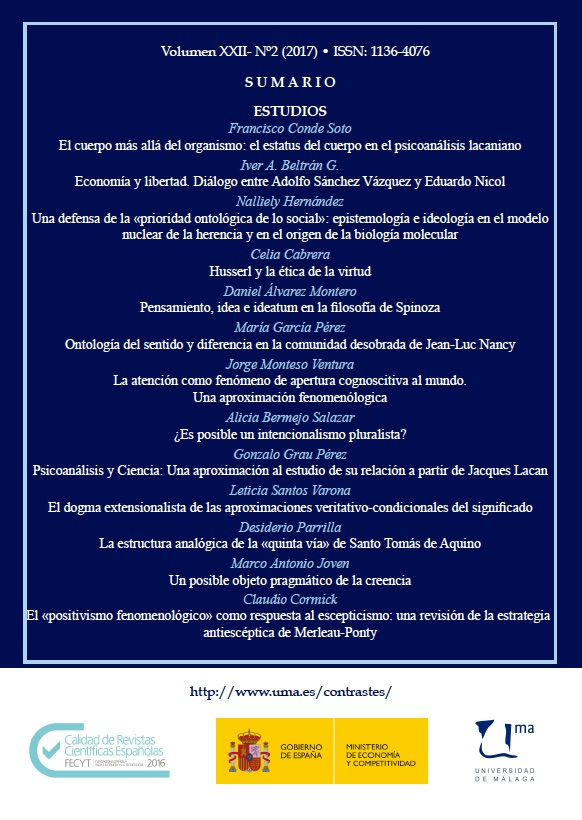Defending the Ontological Priority of the Social: Epistemology and Ideologyin the Nuclear Model of Inheritanceand in the Beginning of the Molecular Biology
DOI:
https://doi.org/10.24310/Contrastescontrastes.v22i2.3474Keywords:
Molecular Biology, Neo-pragmatism, Social Ontology, Genetic Epistemology, Richard Rorty.Abstract
I will relate some social and epistemic aspects involved in the conceptual development of the genetic model in the early Molecular Biology. I will use the link between Biology and Physics as a framework, which supports such assumptions, providing new methodologies, but mainly as a framework that provides a model of objectivity developed within Modern Tradition. Finally, I will interpret this relationship from the pragmatist perspective to embrace Rorty’s thesis on «the ontological priority of the social» which implies understanding biology as a part of a general cultural politics.Downloads
Metrics
Publication Facts
Reviewer profiles N/A
Author statements
Indexed in
-
—
- Academic society
- N/A
- Publisher
- Universidad de Málaga
References
ABIR-AM, Pnina. «The Discourse of Physical Power and Biological Knowledge in the 1930s: A Repraisal of the Rockefeller Foundation’s `Policy ? in Molecular Biology». Social Studies of Science, 12: 341-382, 1982.
———, «De la colaboración multidisciplinar a la objetividad transnacional: el espacio internacional, constitutivo de la biología molecular, 1930-1970», A rb o r, 156(614), 111-150, 1997.
———, «The Rockefeller Foundation and the Rise of Molecular Biology», Nature Reviews, 3, 65-70, 2001.
———, «Molecular Biology in the Context of British, French, and American Cultures» International Social Science Journal, 56 (168), 187–199, 2001.
BARTELS, Ditta. «The Rockefeller Foundation’s Funding Policy for Molecular Biology: Success or Failure?» Social Studies of Science, 14(2): 238-243, 1984.
———, Atomic Theory and the Description of Nature. New York: Cambridge University Press, 1934.
CHADAREVIAN, Soraya de. Designs for Life, Cambridge: Cambridge University Press, 2002. DEWEY, John. Logic: The Theory of Inquiry, Vol. 12, Carbondale: Illinois University Press, 1986.
DOUGLAS, H., «Rejecting the Ideal of Values-Free Science», en Value-Free Science? Ideas and Illusions, (Eds. Kincaid, H., Dupré J. & Wylie, A.), New York: Oxford University Press, pp. 120-139, 2007.
ECHEVERRÍA, Javier. Ciencia y Valores. Barcelona: Ediciones Destino, 2002.
FAERNA, Ángel M. Introducción a la teoría pragmatista del conocimiento, Madrid: Siglo XXI, 1996
FALK, Raphael. «The gene- A concept in Tension» en The Concept of the Gene in Development and Evolution Historical and Epistemological Perspectives, ( E ds). Beurton, P. J. Falk, R. y Rheinbergher H.J., Cambridge: Cambridge University Press, pp. 317-348, 2000. FOX, Evelyn. «Physics and the Emergence of Molecular Biology: A History of Cognitive and Political Synergy». Journal of the History of Biology, 23 (3): 389-409, 1990.
GAUDILLIÈRE, Jean-Paul. «¿La biología molecular en la tradición francesa?: Redefiniendo tradiciones locales y patrones disciplinares», Arbor, 156 (614), 45-7 7, 19 9 7.KAY, Lily E. «Conceptual Models and Analytical Tools: The Biology of Physicist Max D elbr ück». Journal of the History of Biology, 18 (2): 207-246, 1985.
———, The Molecular Vision of Life. Caltech, the Rockefeller Foundation and the Rise of the New Biology. New York: Oxford University Press, 1993.
———, «Rethinking Institutions: Philanthropy as an Historiographic Problem of Knowledge and Power». Minerva, 35: 283-293, 1997.
KOHLER, Robert, E. «The Management of Science: The Experience of Warren Weaver and the Rockefeller Foundation Programme in Molecular Biology». Minerva, 14 (3): 279-306, 1976.
MAYR, Ernst. The Growth of Biological Thought. Diversity Evolution, and Inheritance. Massachusetts, Harvard University Press, 1982.
LEWONTIN, Richard C. Biology as Ideology. The Doctrine of DNA. Ontario: House of Anansi Press, 1995.
O L BY, R o b e r t. «Schrödinger’s Problem: What Is Life?» Journal of the History of Biology, 4 (1): 119-148, 1971.
———, «The Molecular Revolution in Biology», en Companion to the History of Modern Science, (Eds. Olby, R.C., Cantor, J.R.R. y Hodge M.J.S), London, Routledge, pp. 503-521, 1990.
RHEINBERGER, Hans-Jörg, «Fragments from the Perspective of Molecular Biology» en The Concept of the Gene in Development and Evolution Historical and Epistemological Perspectives, (Eds). Beurton, Peter J. et.al., Cambridge: Cambridge University Press, pp. 219-239,2000.
RHEINBERGER, Hans-Jörg, Müller-Wille, Staffan and Meunier, Robert, «Gene», The Stanford Encyclopedia of Philosophy (Spring 2015 Edition), Edward N. Zalta (ed.), URL = <http://plato.stanford.edu/archives/spr2015/entries/gene/>.
RORTY, Richard. «Solidarity or Objectivity?» en Objectivity, Relativism, and Truth. Philosophical Papers Vol. 1, Cambridge: Cambridge University Press, pp. 21-34, 1991.
———, Consecuencias del pragmatismo, Madrid; Tecnos, 1996.
———, «Ph i losophy-Env y», Daedalus, Fall: 18-24, 2004. SAPP, Jan. Beyond the Gene. Cytoplasmic Inheritance and the Struggle for Authority in Genetics. New York: Oxford University Press, 1987.
SERRANO-BOSQUET, Francisco J.; CAPONI, Gustavo. «Warren Weaver y el Programa de Biología Experimental de la Fundación Rockefeller». Scientiae Studia, 12(1): 137-167, 2014.
TABERY, James, PIOTROWSKA, Monika and DARDEN, Lindley, «Molecular Biology», The Stanford Encyclopedia of Philosophy (Spring 2016), Edward N. Zalta (ed.), URL = <http://plato.stanford.edu/archives/spr2016/entries/molecular-biology/>.WEAVER, W. Weaver to Tisdale, Rockefeller Archive Center, RG3, 915, Box 1.2, February 8, 1935.
———, «Why is Science Important?» Nutrition Review, 19(3): 65-68, 1961.
———, «Molecular Biology: the Origin of the Term» Science, 170.581-2, 1970.
YOXEN, Edward. «Giving Life a New Meaning: The Rise of the Molecular Biology Establishment». Scientific Establishments and Hierarchies. Sociology of the Sciences, VI: 123-143, 1982.
Downloads
Published
How to Cite
Issue
Section
License
This journal provides immediate free access to its content under the principle of making research freely available to the public. All content published in Contrastes. Revista Internacional de Filosofía, are subject to the Creative Commons Attribution-NonCommercial-ShareAlike 4.0 license whose full text can be found at <http://creativecommons.org/licenses/by-nc-sa/4.0>
It is the responsibility of the authors to obtain the necessary permissions of the images that are subject to copyright.
Authors whose contributions are accepted for publication in this journal will retain the non-exclusive right to use their contributions for academic, research and educational purposes, including self-archiving or repository in open access repositories of any kind.
The electronic edition of this magazine is edited by the Editorial Service of the University of Malaga (Uma Editorial), being necessary to cite the origin in any partial or total reproduction.










5.png)
